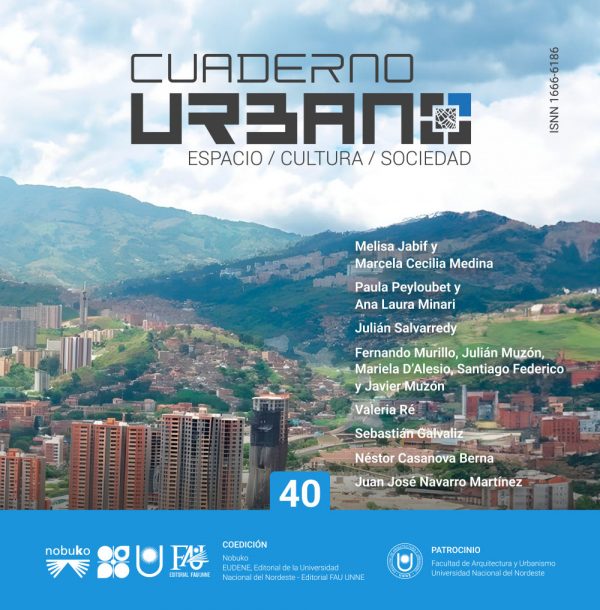Bibliometric and theoretical analysis of the contemporary discussion on the urbanization of urban peripheries in geography
DOI:
https://doi.org/10.30972/crn.40408205Keywords:
Urban periphery, peripheral urbanization, geographyAbstract
The transformation of the peripheral spaces of cities
around the globe is a contemporary concern of geographic
studies and other related disciplines. However,
there is not only a theorization to account for the phenomenon
occurring in the "periphery". Thus, we propose
a bibliometric and theoretical study that establishes
which are the main theories that are being worked on
the urbanization of peripheral spaces in geography. To
achieve this objective, the Scopus and WoS databases
were used, with which an exploration was carried out
from Biblioshiny and later Atlas Ti. In general terms,
there are large fields from which theoretical reflection
on the problems studied can be situated, with a strong
emerging component that comes from the experience
of countries in the global south that make the concepts
used in other areas such as Europe more complex.
Downloads
References
Aguilar, A. G. (2008). Peri-urbanization, illegal settlements and environmental impact in Mexico City. Cities, 25(2),
-145. https://doi.org/10.1016/j.cities.2008.02.003
Asabere, S.; Acheampong, R. A.; Ashiagbor, G.; Beckers, S.; Keck, M.; Erasmi, S.; Schanze, J. & Sauer, D. (2020).
Urbanization, land use transformation and spatio-environmental impacts: Analyses of trends and implications
in major metropolitan regions of Ghana. Land Use Policy, 96, 104707. https://doi.org/10.1016/j.
landusepol.2020.104707
Audirac, I.; Cunningham-Sabot, E.; Fol, S. & Moraes, S. T. (2012). Declining suburbs in Europe and Latin America.
International Journal of Urban and Regional Research, 36(2), 226-244. https://doi.org/10.1111/j.1468-
2011.01093.x
Ayambire, R. A.; Amponsah, O.; Peprah, C. & Takyi, S. A. (2019). A review of practices for sustaining urban and
peri-urban agriculture: Implications for land use planning in rapidly urbanising Ghanaian cities. Land
Use Policy, 84, 260-277. https://doi.org/10.1016/j.landusepol.2019.03.004
Bernal, M. (2021). Estado del arte sobre la urbanización en los bordes de las ciudades. “Una revisión desde la historia
del hábitat popular del sur de Bogotá”. Revista Ciudades, Estados y Política. 10.15446/cep.v8n3.91754
Caldeira, T. P. (2017). Peripheral urbanization: Autoconstruction, transversal logics, and politics in cities
of the global south. Environment and Planning D: Society and Space, 35(1), 3-20. https://doi.
org/10.1177/0263775816658479
Caruso, G. (2001). Periurbanisation, the situation in Europe: A bibliographical note and survey of studies in the Netherlands,
Belgium, Great Britain, Germany, Italy and the Nordic Countries, datar.
Dupuy, G. (1991). L’urbanisme des réseaux, théories et méthodes. Armand Colin.
Geddes, P. (1915). Cities in Evolution. An introduction to the town planning movement and to the study of civics,
Williams & Norgate,
Gündoğan, A. Z. (2021). Rethinking centrality: Extended urbanization in Istanbul. City, 25(1–2), 46–66. https://doi.or
g/10.1080/13604813.2021.1890955
Harris, R. & Vorms, C. (Eds.). (2017). What's in a Name?: Talking about Urban Peripheries. University of Toronto Press.
Hudani, S. E. (2020). The Green Masterplan: Crisis, state transition and urban transformation in post-genocide Rwanda.
International Journal of Urban and Regional Research, 44(4), 673-690. https://doi.org/10.1111/1468-
12910
Kanai, J. M. & Da Silva Oliveira, R. (2014). Paving (through) Amazonia: Neoliberal urbanism and the reperipheralization
of Roraima. Environment and Planning A, 46(1), 62-77. https://doi.org/10.1068/a45415
Keil, R. (2018). Extended urbanization, “disjunct fragments” and global suburbanisms. Environment and Planning
D: Society and Space, 36(3), 494-511. https://doi.org/10.1177/0263775817749594
Lukas, M. & Reis, N. (2022). Introduction: Old and New Dimensions of Peripheral Urbanization in Latin America.
In M. Lukas & N. Reis (Eds.), Beyond the Megacity: New Dimensions of Peripheral Urbanization in Latin
America (pp. 3–54). University of Toronto Press. http://www.jstor.org/stable/10.3138/j.ctv2p7j4pv.4
Leaf, M. (2002). A tale of two villages: Globalization and peri-urban change in China and Vietnam. Cities, 19(1), 23-31.
https://doi.org/10.1016/S0264-2751(01)00043-9
Méndez-Lemus, Y.; Vieyra, A.; Poncela, L.; De la Tejera, B. & Ruiz-López, C. (2022). Peripheralization, ejidos and
agricultural livelihoods in intermediate Mexican cities: The importance of collective agency to reduce
vulnerabilities. Frontiers in Sustainable Cities, 4. https://doi.org/10.3389/frsc.2022.816649
Mubarak, F. A. (2004). Urban growth boundary policy and residential suburbanization: Riyadh, Saudi Arabia. Habitat
International, 28(4), 567-591. https://doi.org/10.1016/j.habitatint.2003.10.010
Obeso Muñiz, I. (2019). Definir la urbanización periférica: Conceptos y terminología. Ería, 39(2), 183–206. https://doi.
org/10.17811/er.2.2019.183-206
Racine, J. B. (1967). Exurbanisation et métamorphisme péri-urbain : introduction a l’étude de la croissance du grand
Montréal., Revue de géographie de Montréal, 22 (2), pp. 313-341.
Roy, A. (2011). Slumdog cities: Rethinking subaltern urbanism. International Journal of Urban and Regional Research,
(2), 223-238. https://doi.org/10.1111/j.1468-2427.2011.01051.x
Sassen, S. (1994). Cities in a World Economy. Pine Forge Press.
Sawyer, L. (2014). Piecemeal urbanisation at the peripheries of Lagos. African Studies, 73(2), 271–289. https://doi.or
g/10.1080/00020184.2014.925207
Sawyer, L.; Schmid, C.; Streule, M. & Kallenberger, P. (2021). Bypass urbanism: Re-ordering center-periphery
relations in Kolkata, Lagos and Mexico City. Environment and Planning A: Economy and Space, 53(4),
-703. https://doi.org/10.1177/0308518X20983818
Steel, G.; Van Noorloos, F. & Klaufus, C. (2017). The urban land debate in the global south: New avenues for research.
Geoforum, 83, 133-141. https://doi.org/10.1016/j.geoforum.2017.03.006
Thuillier, G. (2005). Gated communities in the metropolitan area of Buenos Aires, Argentina: A challenge for town
planning. Housing Studies, 20(2), 255–271. https://doi.org/10.1080/026730303042000331763
Valencia-Hernández, D.; Robledo, S.; Pinilla, R.; Duque-Méndez, N. D. & Olivar-Tost, G. (2020). SAP algorithm for
citation analysis: An improvement to tree of science. Ingeniería e Investigación, 40(1), 45-49. https://doi.
org/10.15446/ing.investig.v40n1.77718
Velázquez, B.R. (2007). Del suburbio y la periferia al borde: el modelo de crecimiento de la Zona Metropolitana del
Valle de México (ZMVM). L'Ordinaire des Amériques, 69-89. https://doi.org/10.4000/orda.3350
Whyte, W. H. (1957). The Exploding Metropolis. University of California Press.
Wirth, L. (1938). Urbanism as a Way of Life, American journal of sociology, 44 (1), 1-24. http://www.jstor.org/stable/
Zhang, Y. (2023). De-peripheralization and rural land capitalization: An empirical study of a public–private partnership
in Zhaoqing, China. Regional Science Policy & Practice, 15(7), 1596–1611. https://doi.org/10.1111/
rsp3.12713
Zhou, T.; Jiang, G.; Zhang, R.; Zheng, Q.; Ma, W.; Zhao, Q. & Li, Y. (2018). Addressing the rural in situ urbanization
(RISU) in the Beijing–Tianjin–Hebei region: Spatio-temporal pattern and driving mechanism. Cities, 75,
Downloads
Published
Issue
Section
License

This work is licensed under a Creative Commons Attribution-NonCommercial-ShareAlike 4.0 International License.
CUADERNO URBANO sustains its commitment to the Open Access policies for scientific information, on account of the fact that both scientific publications and public funded research must circulate freely on the Internet and without restrictions.
CUADERNO URBANO ratifies the Open Access model in which the contents of scientific publications are available in full text free of charge on the Internet, without temporary embargoes, and whose editorial production costs are not transferred to the authors. This policy proposes breaking down the economic barriers that generate inequities both in access to information and in the publication of research results.





.jpg)








